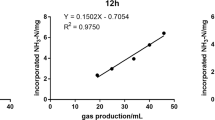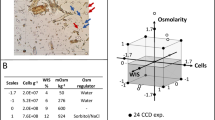Abstract
PROTEIN content is a widely used reference value for microbial growth yield, enzyme activity, and other biochemical quantities. The assay of dissolved protein is relatively easy, being accomplished by measuring the absorbence at 280 mµ or by use of the biuret reagent, etc. The assay of protein in cellular material involves a time-consuming digestion (Kjeldahl method). In addition to being slow, this method is non-specific and does not immediately distinguish between proteins and other nitrogen compounds.
This is a preview of subscription content, access via your institution
Access options
Subscribe to this journal
Receive 51 print issues and online access
$199.00 per year
only $3.90 per issue
Buy this article
- Purchase on Springer Link
- Instant access to full article PDF
Prices may be subject to local taxes which are calculated during checkout
Similar content being viewed by others
References
Cornell, A., Bardawill, C., and David, M., J. Biol. Chem., 177, 751 (1949).
Basler, E., and Commoner, B., Virology, 2, 15 (1956).
Racusen, D., and Foote, M., Arch. Biochem. Biophys., 90, 90 (1960).
Author information
Authors and Affiliations
Rights and permissions
About this article
Cite this article
RACUSEN, D., JOHNSTONE, D. Estimation of Protein in Cellular Material. Nature 191, 492–493 (1961). https://doi.org/10.1038/191492a0
Published:
Issue Date:
DOI: https://doi.org/10.1038/191492a0
This article is cited by
-
Amelioration of lead toxicity by ascorbic acid in sugarcane (Saccharum officinarum L.) under in vitro condition
Environmental Science and Pollution Research (2022)
-
Effect of exogenous application of IAA and GA3 on growth, protein content, and antioxidant enzymes of Solanum tuberosum L. grown in vitro under salt stress
In Vitro Cellular & Developmental Biology - Plant (2020)
-
Enhancement of antioxidant enzyme activities in rice callus by ascorbic acid under salinity stress
Biologia plantarum (2016)
-
Effect of exogenous application of 24-epibrassinolide on growth, protein contents, and antioxidant enzyme activities of in vitro-grown Solanum tuberosum L. under salt stress
In Vitro Cellular & Developmental Biology - Plant (2016)
-
Amelioration of salinity tolerance in Solanum tuberosum L. by exogenous application of ascorbic acid
In Vitro Cellular & Developmental Biology - Plant (2009)
Comments
By submitting a comment you agree to abide by our Terms and Community Guidelines. If you find something abusive or that does not comply with our terms or guidelines please flag it as inappropriate.



